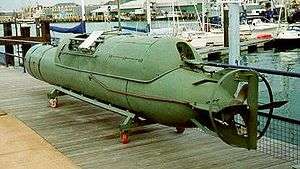Siluro San Bartolomeo
The Siluro San Bartolomeo (St. Bartholomew Torpedo) was an Italian Human Torpedo designed during World War II, used by the Decima Flottiglia MAS for commando style operations. When using the Siluro a Lenta Corsa Maiale Human Torpedo had noticed some limitations, demonstrating the need for an updated version. The project was managed and developed by the engineer of the Genio Naval, Mayor Mario Masciulli, with the help of Captain G.N Travaglino and engineer Guido Cattaneo. The improvement in the materials available for the assembly and parallel new technologies led to a far superior product to the point of not being able to identify and as an outgrowth of the "Siluro a Lenta Corsa" SLC Maiale.
 Siluro San Bartolomeo | |
| History | |
|---|---|
| Class and type: | Human torpedo |
| Name: | Siluro San Bartolomeo |
| Commissioned: | 1943 |
| General characteristics | |
| Length: | 6,77m |
| Propulsion: | 7.5 HP Motor |
| Speed: | 2.3–4 Knots |
| Armament: |
Normal: explosives charge 300 kg Version 2: 400 kg Version 3: Double 180/200 kg charge |

Just three Siluro San Bartolomeo had been manufactured before the date of the Armistice between Italy and Allied armed forces; two remained in La Spezia and one which was sent to Venice was found at the end of the war. Both of La Spezia were consigned to the La Castagna Task Force, an old battery of the Decima Flottiglia MAS under the command of Lieutenant Augusto Jacobacci (Siluro San Bartolomeo pilot). Those had been designated to attack Gibraltar, but the action was suspended with the armistice.
Further reading
- Crociani, Piero; Stacey, Mark; Battistelli, Pier Paolo. Italian Navy & Air Force Elite Units & Special Forces 1940–45. Oxford, United Kingdom: Osprey. p. 12. ISBN 9781780963723.